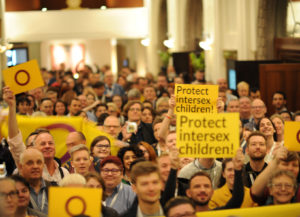By Aurora Wilson
Most people think a person can either be born female or male. While many people fit into this sex binary, there is a third category—intersex—an umbrella term for a group of people who have varying sex characteristics and hormonal diffrences that do not fit into the female/male binary. Intersex people typically have a range of body variations that can be apparent at birth or become so throughout different phases of life. Intersex people are a valuable part of society who are marginalized throughout their daily life, in the medical field, and the workplace.
Anybody can be intersex. Around 1.7% of the population is identified as intersex (about 1 in 1500 to 1 in 2000 births). Being intersex affects biological sex characteristics and their variation, but is not necessarily connected to gender identify or sexual orientation.
Intersex people are the victim of many human rights violations, especially surrounding rights to health and control of their own body. It is common that when intersex babies are born, parents will put them through surgery to remove any unwanted sexual characteristic. These surgeries have life-long affects on mental health and physical health including depression, infertility, pain, and loss of sexual sensation. Surgeries often happen when the children are too young to advocate for themselves, and unfortunately parents do not need a child’s consent to have these surgeries performed. Human Rights Watch says “The procedures are irreversible, nerves that are severed cannot regrow, and scar tissue can limit options for future surgery.”
Furthermore, most anti-discrimination laws and polices do not specifically state protections for intersex people. Intersex people can be subjected to discrimination in the workplace, in educational environments, in health services, and in the job market. Some of this discrimination comes from lack of knowledge about intersex people. There is lack of understanding of the variations of intersex people, even in the medical field.
Everybody can help the intersex community by changing the climate around intersex people and introducing more inclusivity. You can help by educating yourself and others about intersex people and the issues they face. There are also many intersex support and advocacy groups throughout the world. To help the intersex community, the non-consentual, unnecessary, and dangerous surgeries to change sex characteristics need to be banned. Education that includes recognizing intersex people and their variations must become a part of schools, the workplace, and the medical field. Each person has a responsibility to advocate and educate for the equality of intersex people.
